旅游英语知识要点
全国旅游英语口语导游资格考试旅游英语必备知识点

全国旅游英语口语导游资格考试旅游英语必备知识点导游背景介绍旅游导游是旅游行业中非常重要的一部分,导游不仅需要具备良好的英语口语能力,还需要有丰富的旅游知识。
全国旅游英语口语导游资格考试是评估导游在英语和旅游知识方面的能力的重要考试。
下面是一些旅游英语必备的知识点,供导游备考参考。
必备词汇在进行旅游导游工作时,熟悉一些与旅游相关的词汇是非常重要的。
以下是一些必备的旅游英语词汇:1.景点名称:famous attractions2.旅行社:travel agency3.导游:tour guide4.旅游团:tour group5.游客:tourists6.酒店:hotel7.交通工具:transportation8.购物:shopping9.美食:local cuisine10.纪念品:souvenir常用句型除了词汇外,掌握一些常用的句型也是旅游导游必备的能力。
以下是一些常用的句型:1.欢迎来到……:Welcome to...2.我们现在要前往……:We are now heading to...3.请跟紧我:Please follow me closely.4.这是……的著名景点:This is the famous attraction of...5.如果你们有任何问题,请随时问我:If you have any questions, feel free to ask me.6.请注意安全:Please pay attention to safety.7.我们将在此停留一段时间:We will stay here for a while.8.请确保不要遗失您的个人物品:Make sure you don't lose your personal belongings.9.请按时回到集合地点:Please be back at the meeting point on time.10.祝大家玩得愉快:I hope you all have a great time.常见问题解答作为导游,经常会遇到游客提出的各种问题。
高中英语必修一Unit-3-Travel-journal知识点

stop doing 停止做某事16. as usual 像平常一样17. so…that 如此… 以至于…So + adj + a/an + n. + thatSuch + a/an +adj. + n. + that18. be familiar with 对…熟识(人作主语)be familiar to 为…所熟识(物作主语)二、学问要点1. Which kind of transport do you prefer to use: bus or train?prefer v.更宠爱;选择某事物(而不选择其他事物)(1)prefer sth.更宠爱……prefer (sb.) to do sth.更宠爱(某人)做……prefer that更宠爱[that从句中常用(should)+动词原形]prefer sth./doing...to sth./doing...与……相比更宠爱……;宁愿……,不愿……e.g. I would prefer meat to fish.我宠爱肉赛过(宠爱)鱼。
I prefer singing to acting. 我宠爱唱歌赛过演戏。
prefer to do...rather than do...宁可……也不……e.g. He prefers to stay at home rather than go shopping.他宁可呆在家里也不情愿去逛商店。
(2)preference n. 偏爱;爱好;宠爱give preference to sb./sth.给……以实惠;优待2. Then she persuade me to buy one.然后她动员我也买了一辆.persuade vt.劝服; 劝服; vi.被劝服persuade sb. (not) to do sth.persuade sb. into / out of doing sth.e.g. I persuaded him to do it. = persuade him into doing it.我已劝服他做这件事。
初二英语旅游与地理常识词汇
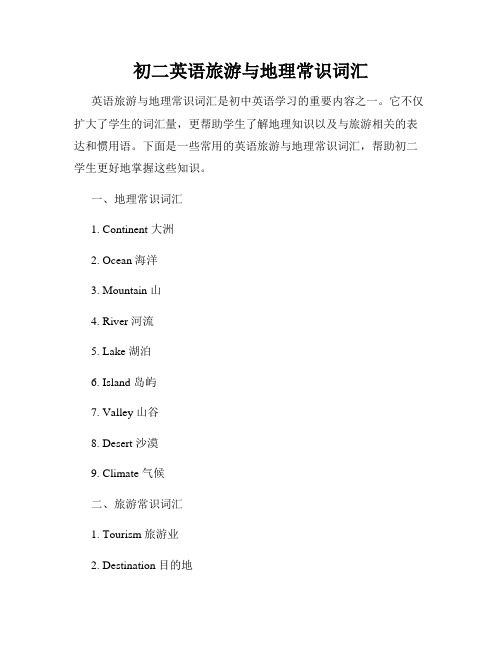
初二英语旅游与地理常识词汇英语旅游与地理常识词汇是初中英语学习的重要内容之一。
它不仅扩大了学生的词汇量,更帮助学生了解地理知识以及与旅游相关的表达和惯用语。
下面是一些常用的英语旅游与地理常识词汇,帮助初二学生更好地掌握这些知识。
一、地理常识词汇1. Continent 大洲2. Ocean 海洋3. Mountain 山4. River 河流5. Lake 湖泊6. Island 岛屿7. Valley 山谷8. Desert 沙漠9. Climate 气候二、旅游常识词汇1. Tourism 旅游业2. Destination 目的地3. Sightseeing 观光, 游览4. Tourist 旅游者5. Hotel 酒店6. Flight 航班7. Passport 护照8. Visa 签证9. Guide 导游10. Souvenir 纪念品通过了解这些旅游与地理常识词汇,学生可以拓展视野,了解世界各地的地理环境和旅游资源。
同时,学会使用这些词汇也能够帮助学生更好地进行英语口语交流,提升语言表达能力。
在英语课堂上,教师可以采用多种形式和方法教授这些词汇。
以下是一些教学推荐:1. 使用图片和地图:通过展示适合学生年龄的图片和简单的地图,让学生了解不同大洲、国家和地理特点,然后加以词汇讲解。
2. 观看相关视频:在课堂上播放有关旅游景点和地理环境的视频,让学生通过视觉和听觉感受到真实的场景,加深对词汇的印象。
3. 创设情境对话:设计旅游场景对话,让学生在实际情景中运用这些词汇。
例如:学生可以扮演导游和游客,模拟旅游咨询和交流。
4. 辩论活动:组织辩论活动,让学生辩论旅游业对地方经济的影响,鼓励学生使用词汇以提升语言运用能力。
5. 制作海报或旅游手册:让学生自主选择一个国家或旅游目的地,制作相关的海报或旅游手册,通过展示和分享以提升对词汇的理解和运用。
最后,老师和家长应该给予学生足够的练习机会,帮助他们记忆和巩固这些词汇。
出国旅游必备英语知识
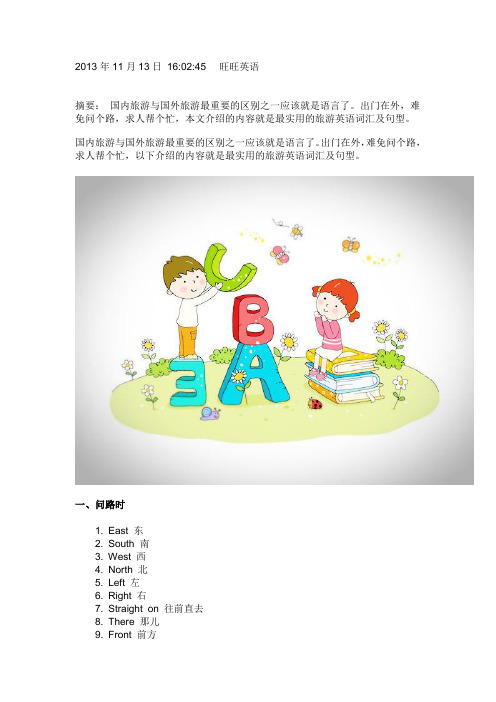
2013年11月13日16:02:45 旺旺英语摘要:国内旅游与国外旅游最重要的区别之一应该就是语言了。
出门在外,难免问个路,求人帮个忙,本文介绍的内容就是最实用的旅游英语词汇及句型。
国内旅游与国外旅游最重要的区别之一应该就是语言了。
出门在外,难免问个路,求人帮个忙,以下介绍的内容就是最实用的旅游英语词汇及句型。
一、问路时1. East 东2. South 南3. West 西4. North 北5. Left 左6. Right 右7. Straight on 往前直去8. There 那儿9. Front 前方10. Back 后方11. Side 侧旁12. Before 之前13. After 之后14. First left/right 第一个转左/右的路二、请问如何前往 ...1. Excuse me, How do I get to the .......? 请问如何前往?2. How do I get to the airport? 请问如何前往机场?3. How do I get to the bus station? 请问如何前往公车站?4. How do I get to the metro station? 请问如何前往地下铁路站?(Me tro乃欧洲常用字)5. How do I get to the subway station? 请问如何前往地下铁路站?(S ubway乃北美洲常用字)6. How do I get to the underground station? 请问如前往地下铁路站?(Underground 乃英国常用字)7. How do I get to the train station? 请问如何前往火车站?8. How do I get to the hotel XXX? 请问如何前往XXX酒店?9. How do I get to the police station? 请问如何前往警局?10. How do I get to the post office? 请问如何前往邮政局?11. How do I get to the tourist information office? 请问如何前往旅游资讯局?三、请问附近...1. Excuse me, Is there ....... near by? 请问附近有没有...?2. Is there a baker near by? 请问附近有没有面包店?3. Is there a bank near by? 请问附近有没有银行?4. Is there a bar near by? 请问附近有没有酒吧?5. Is there a bus stop near by? 请问附近有没有公车站?6. Is there a cafe near by? 请问附近有没有咖啡店?7. Is there a cake shop near by? 请问附近有没有西饼店?8. Is there a change bureau near by? 请问附近有没有找换店?9. Is there a chemist's near by? 请问附近有没有药剂师?10. Is there a department store near by? 请问附近有没有百货公司?11. Is there a disco near by? 请问附近有没有的士高?12. Is there a hospital nearby? 请问附近有没有医院?13. Is there a night club near by? 请问附近有没有夜总会?14. Is there a post box near by? 请问附近有没有邮政局?15. Is there a public toilet near by? 请问附近有没有公共厕所?16. Is there a restaurant near by? 请问附近有没有餐厅?17. Is there a telephone near by? 请问附近有没有电话?18. Is there a travel agent near by? 请问附近有没有旅游社?19. Is there a youth hostel near by? 请问附近有没有青年旅馆?。
旅游用语知识点归纳总结

旅游用语知识点归纳总结一、常见表达1. 问候语Hello! ---- 你好!Good morning! / Good afternoon! / Good evening! ---- 早上好!/下午好!/晚上好! How are you? ---- 你好吗?Nice to meet you! ---- 很高兴见到你!Have a nice trip! ---- 旅途愉快!2. 询问与回答Can I help you? ---- 我可以帮你吗?Where is the nearest bus station? ---- 最近的公交车站在哪里?How do I get to the airport? ---- 我怎样去机场?Is there a hotel nearby? ---- 附近有酒店吗?How much does it cost? ---- 多少钱?It's too expensive. ---- 太贵了。
I'm looking for a restaurant. ---- 我在找一家餐馆。
3. 预订与购票I'd like to book a room. ---- 我想预订一个房间。
Do you have any available rooms? ---- 有空房间吗?I'd like to buy a ticket to Paris. ---- 我想买一张去巴黎的机票。
How much is a round-trip ticket to London? ---- 去伦敦的往返票多少钱?4. 向导和导游Can you show me the way to the museum? ---- 你能告诉我去博物馆的路吗?Could you take a photo for me, please? ---- 你可以帮我拍个照片吗?Can you recommend a good restaurant for me? ---- 你可以给我推荐一家好餐馆吗?5. 紧急情况Help! ---- 救命!Call the police! ---- 叫警察!I need a doctor. ---- 我需要医生。
九年级上册英语unit6知识点归纳

九年级上册英语unit6知识点归纳在九年级上册的英语教材中,unit6是一个关于旅行的单元。
本单元主要涉及旅行的话题,探索不同国家和文化的差异,以及与旅行有关的必备知识和技巧。
在这篇文章中,我们将对unit6的知识点进行归纳和总结,帮助同学们更好地理解和掌握这些内容。
句型和语法:本单元中,我们学习了许多关于旅行的常用句型和语法结构。
比如,在询问或描述旅行计划时,我们可以使用以下句型:1. Are you planning to visit any famous landmarks?你计划参观一些著名的地标吗?2. I'm going to visit the Great Wall next week.下周我打算去参观长城。
3. Have you ever been to the Eiffel Tower?你去过埃菲尔铁塔吗?除了这些常见句型外,本单元还涉及到了被动语态、宾语从句以及时间状语从句等语法结构。
例如:1. The hotel was built last year.这家酒店是去年建的。
(被动语态)2. My friend told me that he would go to Japan.我朋友告诉我他将去日本。
(宾语从句)3. After I finish my exams, I will go on a trip.我考试结束后,我会去旅行。
(时间状语从句)这些语法结构对于准确表达和理解旅行计划以及与他人交谈都非常重要,同学们要多做练习以加深对这些结构的理解和应用。
相关词汇和短语:在unit6中,我们还学习了许多与旅行有关的重要词汇和短语,这些词汇和短语不仅可以帮助我们进行旅行计划的讨论,也可以用于描述旅行体验和感受。
一些常用的词汇和短语包括:1. tourist attractions旅游景点2. cultural differences文化差异3. local cuisine当地美食4. souvenir纪念品在我们进行英语口语交流时,运用这些词汇和短语可以让我们的表达更加准确和流利。
自考旅游英语复习资料travelEnglish
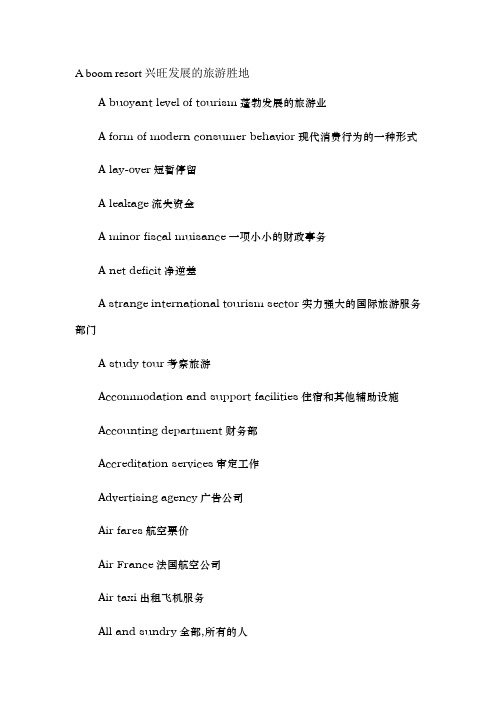
A boom resort兴旺发展的旅游胜地A buoyant level of tourism蓬勃发展的旅游业A form of modern consumer behavior现代消费行为的一种形式A lay-over短暂停留A leakage流失资金A minor fiscal muisance一项小小的财政事务A net deficit净逆差A strange international tourism sector实力强大的国际旅游服务部门A study tour考察旅游Accommodation and support facilities住宿和其他辅助设施Accounting department财务部Accreditation services审定工作Advertising agency广告公司Air fares航空票价Air France法国航空公司Air taxi出租飞机服务All and sundry全部,所有的人All walks of life各阶层All-inclusive package tours价格全包旅游An accelerator concept加速器原则An invisible payment on Britain’s balance英国账目上的无形支出Annual receipts年收入Arts and craft工艺美术As far as the demand for travel services is concerned就旅游服务的需求而言ASEAN countries东南亚国家联盟August Bank Holiday八月银行假日August bodies权威机构Back office system后台办公系统Baggage checks行李票Balance of payments with the outside world对外收支平衡Balance of payments收支平衡Basic point-to point air fares两地间基本航空运作Be tailored to each executive’s needs根据每个商务Bermuda百慕大群岛Boeing757波音757British Airways英国航空公司Burgeoning tourism industry刚刚萌芽的旅游工业Business travel agent专门经办商务旅游的代理商Business traveler商务旅游者cable cars缆车Capital investment资本投资Car hire小汽车出租Carry capacity运载能力Charter aircraft包机Charter flights包机航班Chief engineer总工程师Come into service开始投入使用Commissions佣金Commuter airlines地方短距离运输航空公司Computer graphic package计算机图形包Conditions旅游中条件或服务项目Congloments联合大企业Contracting countries签约国Controller or chief accountant财务部总审计师或总会计师Convention hotels会议饭店Cottage industries家庭手工业Cross-border travel横穿边境的旅行CRS)Computer reservations system计算机预定系统Cruise ships巡游船CTC )Certified travel counselors持有证书的旅游顾问Culinary arts烹调艺术Cultural visit文化旅游Customized services按要求提供的服务项目Dealers in dreams销售梦幻Densely crowed cities人口稠密的地方Design studio设计室Diagonal intergration斜向联合Direction of sales销售部总监Domestic tourism国内旅游Dorminant paradig,主要形式Dwell on 详述Ecosysytems生态系统Education visits教育旅游,休学旅游Empty nesters没有孩子拖累的家庭(空巢效应)En route在途中End objective最终目标Engineer department工程部Enhancing human capital through training and education通过教育与培训来增强人力资本的势力Enjoy more preferential government policies享受政府更多的优惠政策Enter into the very fabric of life走入真正的生活当中去Entrepreneurial skills and ingenuity企业经营技巧与创新Ethnic minority groups少数民族European Community欧洲共同体Excluded by direct reference明确指出不包括Executive aircraft公务飞机Executive housekeeper客房部主管Exhaust fumes废气Exotic and unusual holidays猎奇旅游Expert Statistical Group专家统计小组Extras各种额外费用Flag-carrier以国家航运为主业的国家航空公司Food and beverage department餐饮部Food and beverage manager餐饮部经理Frequent flyer programmes飞行常客奖励计划Front office system前台办公系统Frontier formalities边境手续Games room游艺室Gard currency硬通货Gard-wired硬接线General manager总经理Generating areas旅游产生地Given no commensurate decline in living standards在不考虑生活水准大幅下降的情况下GNP)Gross national product国民生产总值High-spend visitors高消费游客Hold for old and new tourism用于旧旅游和新旅游Holiday Inn假日旅游公司Hotel chains饭店联号Impulse purchasing 冲动购买In the event of customer complaints如果顾客提出投诉In the form of holographs一全息照片的形式Inbound tourism入境旅游Income multiplie收入乘数Independent inclusive tour个体包价旅游Indulge in尽情享受Industry code of conduct行业行为规范In-flight magazines机上杂志In-house compute公司内部使用的计算机Instant culture文化快餐Insurance coverage保险范围Internal tourism境内旅游International tourism国际旅游Inter-office computer linkups办公室间的计算机连用Into its initial stage in the development cycle进入发展周期的初始阶段Invisible receipt无形收入Invisibles无形商品Itineraries旅游活动日程,旅游路线ITX)Inclusive Tour Excursion游览包价旅游Jet airliner喷气式飞机Jurisdictions管辖区Kurtaxe 疗养税Labor-intensive industry劳动密集型产业Lay analyst非专业分析家Leisure time余暇Lesser developed countries较不发达国家Load factors飞机载客率,机座占有率Local color地方色彩Long-haul and short-haul长途和短途Long-haul domestic travel国内长距离旅游Make a profit 获得利润Make ends meet使收支相抵,量入为出Management know-how管理方面的实际技巧,经验Market oriented reforms以市场为导的改革Market segmentation市场细分Marketing tool市场营销工具Mass tourism大众旅游Monorails operated by magnetism靠磁力运行的单轨铁路More green更有环境保护意识Multi-stopover independent tours旅游中多次停留的散客National income国民收入National tourism国家级旅游Nature preserves/reserves自然保护区Need deficiencies需求不足Net discretionary incomes可以随意支配的收入Non-commodity currency非商品货币Non-profit overseas offices非营利性海外机构OECD)the organization for Economic cooperation and development经济合作与发展联盟On a case by case basis依据具体情况处理的原则Organizational chart饭店组织结构图Outbound tourism出境旅游Overseas Chinese海外华人Package tour包价旅游Paid holiday带薪假日Pay a premium交学费Peripheral environment周边环境Personnel department人事部Personnel director人事部主任Pleasure craft游乐船Police registration出境证明Potential travelers潜在的旅游者Preferential policies优惠政策Price inelastic无价格弹性Profit-making corporation盈利公司Publicity material 宣传品Purchasing agent采购员Purchasing power购买力pylons架线塔Quick access to information信息途径快捷Rare flora and fauna珍稀植物和动物Rates of inflation通货膨胀Recreation vehicles娱乐,行宿两用车Refusal to grant exit permits拒绝发放出境证明Relieving the pressure on other rural areas减轻时其他乡村地带的压力Repeat business回头客带来的生意Resident manger驻店经理,客房部经理Retail agencies 零售旅行社Return on sales销售回报Rooms department客房部Round trip往返旅行Round-the-world trip环球旅行Sales department销售部Sales/distribution outlets销售网点Sand dunes沙丘Scale economies规模经济Scheduled liner定期客轮Scheduled or charter services不定期客运或包机服务Scope economies范围经济Severe environmental degradation from heavy usage由于使用频繁而造成的严重的环境恶化Ski pistes滑雪道skyscraper hotel syndrome摩天宾馆综合症society environmental needs社会环境需求source of revenue收入来源specialist operators专营某种旅游的经营商specialized tourism专项旅游stand-by fares候补票价subsidized exchange rates特别补贴兑换率Sunbathing日光浴tailor-made services特别服务项目target markets目标方面target sales目标销售额tax receipts税收收入terra cotta warriors and horses兵马俑tertiary industry第三产业the “Grand Tour”大旅游the aircraft is placed at the desposal of the operator飞机提供旅游自由支配the balance of payments on the tourism account旅游账目的收支平衡the budge market廉价市场the Caribbean Community加勒比共同体the deep-seated traditions根深蒂固的传统the done thing 合乎俗礼的事the drawing power吸引力the East Caribbean Common Market加勒比海共同市场the ecological balance生态平衡the Eurasian Continent欧亚大陆the Far East远东the foreign exchange receipts外汇收入the idea of prepotency优先原理The International Conference on Travel and Tourism Statistics联合国统计委员会the International Monetary Fund国际货币基金组织the jargon of marketing营销学的术语the League of Nations国际联盟the less developed interior of the country国内较不发达的内陆地区the life cycle of the family家庭生命周期the local share of the market当地市场份额the luxury market豪华市场the midscale market中级市场the mode of travel旅行方式The National Travel Survey国民旅游调查the supply and demand equilibrium供求平衡关系the support services辅助服务the United Nations Conference on Trade and Development联合国贸易与发展The US Travel Data Center 美国旅游资料中心TIM)Tourism Income Multiplier旅游收入增值to give full exposures to China’s tourism resources以充分展现中国的旅游to have family reunions举家团聚to package their own tours组合自己的报价旅游tour basing fares航空包价旅游票价tour brochure旅游宣传册tourism boom旅游业的繁荣Tourist interests旅游者权益Tourist operators旅游经营商Transit travelers过境旅游者Travel for travel’s sake为旅游而旅游Travel principals旅游经营商Travel retailers旅游零售商/代理商Trunk route airlines干线航空公司Umbrella brochure伞式宣传册Unit costs单位成本United Nations General Assembly联合国大会VAT)Value added tax增值税Vertical integration垂直合并Visual pollution视觉污染Wind erosion风蚀Word of mouth recommendation口头宣传Word of mouth 口碑World cultural heritage世界文化遗产Low countries低地国家vertical and horizontal integration垂直合并和水平式结合airline oligopolies 航线的寡头垄断the International Air Transport Association国际航空运输协会air carriers航空公司waybills运货单accreditation services审定工作ICAO)the International Civil Aviation Organization国际民航组织PATA)The Pacific Asia Travel Association太平洋亚洲旅行协会(太亚旅协)disposable income 可自由支配的收入non-residential travel 非居住地旅游natural reserve 自然保护区Sustainable development 可持续发展Discretionary time 可自由支配的时间Ethnic tour 民俗风情游Contrived attractions 人文旅游景点Invisible products 无形产品Cultural heritage 文化遗产Package tour 包价旅游Landscape poetry 山水诗Maritime commerce 海上贸易Outbound tourists 出境旅游者Complete harmony of man and nature天人合Foreign exchange income 外汇收入Nation of tourists 旅游容源国Temper one's wills 磨炼意志Offering sacrifices to Heaven and Earth 封禅Terracotta soldiers and horses 兵马俑A carefree journey 逍遥游Encyclopedic knowledge 渊博的知识(万事通)Cultural accomplishment 文化素养To be chest out and stomach in 挺胸收腹A land of protocol 礼仪之邦Customers foremost ,service best 宾客第一服务至上Eye contact 眼神交流Psychological qualities 心里素质Repeated customers 回头客Courtesy and etiquettes 礼貌礼仪Personal hygiene 个人卫生The Marble Archway 牌坊Spring at Su Causeway 苏堤春晓Three Pools Mirroring the Moon 三潭映月Peak Flown From Afar 飞来峰The Big Wild Goose Pagoda 大雁塔The Hall of Supreme Harmony 太和殿The Hall of Praying for Good Harvest 祈年殿Listening to Orioles Singing in the Willows柳浪闻莺The Terra Cotta Warriors and Horses of Qin Shi Huang 秦始皇兵马俑The Forest of Stone Tablets 西安碑林Buddhist Paradise 极乐世界To do service 做礼拜The Theory of Five Elements 五行学说Book of Changes 易经Do not to do others what you do not want done to yourself 己所不欲勿施于人The art of Buddhist figures 佛像艺术The Temple of Three Pures 三清宫The Temple of Town God 城隍庙Make a pilgrimage to Mecca 朝觐麦加Easter 复活节Sutra Library 藏经阁Old Homes in the southern Anhui 皖南古居The Palace of Earthly Tranquility 坤宁宫Glazed tiles 琉璃瓦Circular stone terrace 圆形汉白玉台基Timber structure 木结构Place of excellent geomantic quality 风水宝地The symmetrical plain layout 对称平面布局Stone animals and human statues 石像生The Main Buddha Hall 大雄宝殿Art of gardening 造园艺术Monastery gardens 寺庙园林Come back to nature 回归自然View borrowing 借景The Mountain-in-View Tower 见山楼The zigzag bridge 曲桥View hindering 障景The Bonsai Garden 盆景园Inscribed tablets 匾额楹联Water-side pavilions 水榭Vermicelli with Spicy Minced Pork 蚂蚁上树Traditional medicine and food share a common origin 衣食同源Savory and Crisp Duck 香酥鸡Clear Stewed Meatballs in Yangzhou清炖扬州狮头Stewed mixed vegetables 罗汉斋Chicken cubes with chili peppers 辣子鸡丁Vegetarian "chicken " 素鸡Table manners 餐桌礼仪Eight treasure porridge 八宝粥Melon carving arts 瓜雕艺术Bodiless lacquer ware 脱胎漆器Elegant modelling and lustrous color造型大方.色泽光润Hand-stitching work 挑花An embroidery bamboo scroll 刺绣竹卷轴画Glazing techniques 上釉技术Neolithic relics 新石器时代遗址Yixing Zisha (Purple Clay )ware 宜兴紫沙陶Veined porcelain 纹片瓷The double-sided embroidery 双面绣Chrysanthemum stone carving 菊花石雕The Autumnal Equinox 秋分Height Ascending Festival 登高节Nature walks in spring 踏青Dragon Boat Racing 龙舟赛Stamping on the Flower Hill Festival踩花山节Grain in ear 芒种Set off firecrackers 放鞭炮Cultural connotations 文化内涵Walk on stilts 踩高跷Enjoying the flourishing chrysanthemum 赏菊Intercultural communication 跨文化交际Interaction function 交互功能Verbal greetings 言语问候Intonation patterns 语调模式High context culture 高文化语境Language barriers 语言障碍Cultural difference factors 文化差异因素Drop one's voice to a low pitch 降低声调Culture shock 文化休克Behavior patterns 行为方式Look somebody in the eye 正视M-time and P-time 单一性时间观与多样性时间观Eye movement 眼部动作Touching behavior 触摸行为Culture acquisition 文化习得To kill time 消磨时间Nonverbal behaviors 非言语行为sit cross -legged翘二郎腿To save face 顾全面子Space orientation 空间取向Rule of protocol 礼仪规范Exchange pleasantries 寒暄Ethnic heritage 民族传统Put a burden on 增加负担A floral arrangement 饰有花卉图案的安排表Etiquettes and taboos 礼仪与禁忌Good quality wine 优质葡萄酒Lightly kissing on the cheeks 轻吻脸颊a token of affection 慈爱表现The extended family 大家庭。
旅游英语实用知识点总结
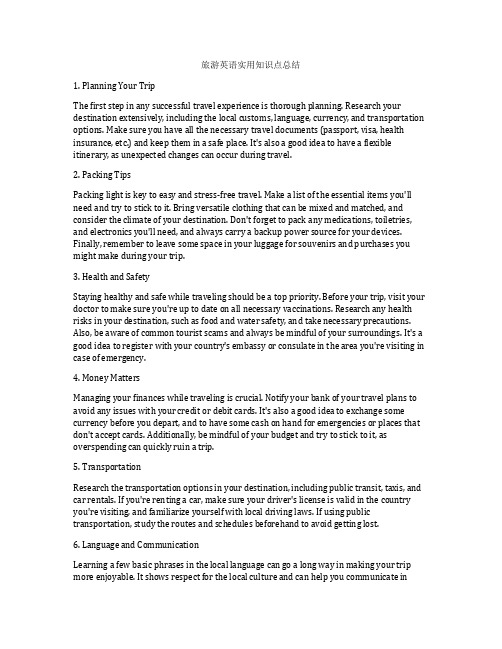
旅游英语实用知识点总结1. Planning Your TripThe first step in any successful travel experience is thorough planning. Research your destination extensively, including the local customs, language, currency, and transportation options. Make sure you have all the necessary travel documents (passport, visa, health insurance, etc.) and keep them in a safe place. It's also a good idea to have a flexible itinerary, as unexpected changes can occur during travel.2. Packing TipsPacking light is key to easy and stress-free travel. Make a list of the essential items you'll need and try to stick to it. Bring versatile clothing that can be mixed and matched, and consider the climate of your destination. Don't forget to pack any medications, toiletries, and electronics you'll need, and always carry a backup power source for your devices. Finally, remember to leave some space in your luggage for souvenirs and purchases you might make during your trip.3. Health and SafetyStaying healthy and safe while traveling should be a top priority. Before your trip, visit your doctor to make sure you're up to date on all necessary vaccinations. Research any health risks in your destination, such as food and water safety, and take necessary precautions. Also, be aware of common tourist scams and always be mindful of your surroundings. It's a good idea to register with your country's embassy or consulate in the area you're visiting in case of emergency.4. Money MattersManaging your finances while traveling is crucial. Notify your bank of your travel plans to avoid any issues with your credit or debit cards. It's also a good idea to exchange some currency before you depart, and to have some cash on hand for emergencies or places that don't accept cards. Additionally, be mindful of your budget and try to stick to it, as overspending can quickly ruin a trip.5. TransportationResearch the transportation options in your destination, including public transit, taxis, and car rentals. If you're renting a car, make sure your driver's license is valid in the country you're visiting, and familiarize yourself with local driving laws. If using public transportation, study the routes and schedules beforehand to avoid getting lost.6. Language and CommunicationLearning a few basic phrases in the local language can go a long way in making your trip more enjoyable. It shows respect for the local culture and can help you communicate insimple situations. In addition, consider investing in a translation app or phrasebook to aid in more complex conversations with locals.7. Cultural RespectRespecting the local customs and traditions is essential when traveling to a new place. Educate yourself about the cultural norms in your destination, including appropriate dress, behavior, and interactions with locals. Always be respectful of sacred sites and monuments, and remember that you are a guest in someone else's home.8. Local CuisineOne of the best ways to experience a new culture is through its food. Be open to trying new dishes and flavors, but also be mindful of any dietary restrictions or food allergies you may have. Research any food safety guidelines for your destination and be cautious of street food if you have a sensitive stomach.9. AccommodationsChoose your accommodations wisely, taking into account location, price, and reviews from previous guests. Whether you're staying in a hotel, hostel, or vacation rental, make sure to book well in advance, especially during peak travel seasons. It's also a good idea to have a backup plan in case of any issues with your reservations.10. Stay FlexibleFinally, remember to stay flexible and open-minded during your travels. Unexpected changes and challenges are a natural part of the travel experience, and being able to adapt and go with the flow will make your journey much more enjoyable. Embrace the differences and surprises you encounter, and allow them to enrich your travel experience.In conclusion, traveling can be a deeply rewarding experience, but it also requires careful planning and preparation. By following these practical travel tips, you can ensure a smooth and enjoyable journey, and create memories that will last a lifetime. So, pack your bags, open your heart, and get ready to explore the amazing world around you!。
初二英语旅游景点知识点

初二英语旅游景点知识点英语旅游景点知识点可以帮助初二的学生更好地了解世界各地的著名景点,并学习相关的英语词汇和表达。
以下是一些常见的英语旅游景点知识点:1. 伦敦塔桥(Tower Bridge)伦敦塔桥是一座跨越泰晤士河的著名吊桥,位于伦敦市中心。
游客可以参观桥上的展览,了解其建造历史和背后的故事。
在参观过程中,学生可以学习如何用英语描述桥梁的结构、功能以及各个部位的名称。
2. 埃菲尔铁塔(Eiffel Tower)埃菲尔铁塔是法国巴黎的标志性建筑,也是世界闻名的旅游景点之一。
学生可以通过学习与铁塔有关的英语名词和形容词来描述其外观和位置,如"tower"(塔)、"metal"(金属)、"tall"(高的)等。
同时,学生还可以了解到铁塔的历史和为法国人民带来的象征意义。
3. 金字塔(Pyramids)埃及的金字塔是古代世界的奇迹之一,也是世界遗产。
学生可以学习关于金字塔的英语词汇和短语,如"sphinx"(狮身人面像)、"pharaoh"(法老)、"mummy"(木乃伊)等。
通过了解金字塔的历史和建造过程,学生还可以学到更多有关埃及古文明的知识。
4. 自由女神像(Statue of Liberty)自由女神像位于美国纽约市,是美国的象征之一。
学生可以通过学习与女神像相关的英语词汇和表达方式,如"freedom"(自由)、"torch"(火炬)、"crown"(皇冠)等,来描述女神像的特点和象征意义。
此外,学生还可以了解女神像背后的故事,以及它对美国历史和价值观的重要性。
5. 印度泰姬陵(Taj Mahal)泰姬陵是印度阿格拉市最著名的旅游景点之一,也是世界文化遗产。
学生可以学习与泰姬陵相关的英语词汇和短语,如"marble"(大理石)、"architecture"(建筑风格)、"monument"(纪念碑)等。
旅游英语一看就会讲解
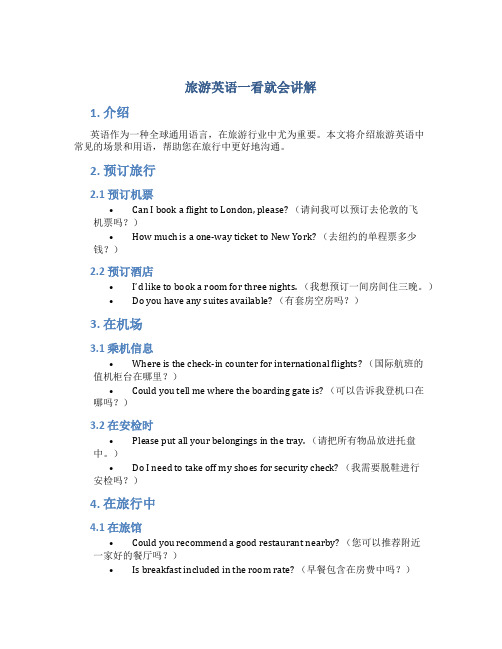
旅游英语一看就会讲解1. 介绍英语作为一种全球通用语言,在旅游行业中尤为重要。
本文将介绍旅游英语中常见的场景和用语,帮助您在旅行中更好地沟通。
2. 预订旅行2.1 预订机票•Can I book a flight to London, please? (请问我可以预订去伦敦的飞机票吗?)•How much is a one-way ticket to New York? (去纽约的单程票多少钱?)2.2 预订酒店•I’d like to book a room for three nights. (我想预订一间房间住三晚。
)•Do you have any suites available? (有套房空房吗?)3. 在机场3.1 乘机信息•Where is the check-in counter for international flights? (国际航班的值机柜台在哪里?)•Could you tell me where the boarding gate is? (可以告诉我登机口在哪吗?)3.2 在安检时•Please put all your belongings in the tray. (请把所有物品放进托盘中。
)•Do I need to take off my shoes for security check? (我需要脱鞋进行安检吗?)4. 在旅行中4.1 在旅馆•Could you recommend a good restaurant nearby? (您可以推荐附近一家好的餐厅吗?)•Is breakfast included in the room rate? (早餐包含在房费中吗?)4.2 景点参观•How much is the entrance fee to the museum? (进博物馆需要多少门票费用?)•Can you recommend a tour guide for our group? (你能推荐一个导游给我们团吗?)5. 紧急情况5.1 失物招领•I’ve lost my wallet. Can you help me find it? (我的钱包丢了,你能帮我找找吗?)•Is there a lost and found office in the airport? (机场里有失物招领处吗?)5.2 医疗救助•I need to see a doctor. Where is the nearest hospital? (我需要看医生,最近的医院在哪里?)•Can you call an ambulance for me? (你能给我叫一辆救护车吗?)6. 总结本文介绍了旅游英语中常见的场景和用语,希望能帮助您在旅行中更好地与人沟通。
高考英语 Unit3《Travel journal》知识与要点课件 新人教版必修1

【链接训练】
In order to change attitudes ________ employing women,the government is bringing
in new laws.
A.about
B.of
C.towards
D.on
【解析】 考查介词的用法。句意为:为
了转变招聘女性的态度,政府正在出台新的 法律。attitude to/towards为固定用法,表示 “对于……的态度”。
重点 短语
重点 句型
ever since,be fond of,change one's mind,give in, care about,graduate from,make up one's mind,as usual,at midnight
1.It was my sister who first had the idea to cycle along
同类辨析
【链接训练】
The number of deaths from heart disease
will be reducedgreatly if people ______ to eat
more fruit and vegetables.
A.persuade
B.will
persuade
C.be persuaded
话题 功能 语法
重点 单词
1.Travelling(旅游) 2.Describing a journey(描述一次旅 行)
1.Talking about future plans(谈论将来的计划) 2.Good wishes(祝愿) 3.Farewells(告别)
旅游英语选读知识点整理
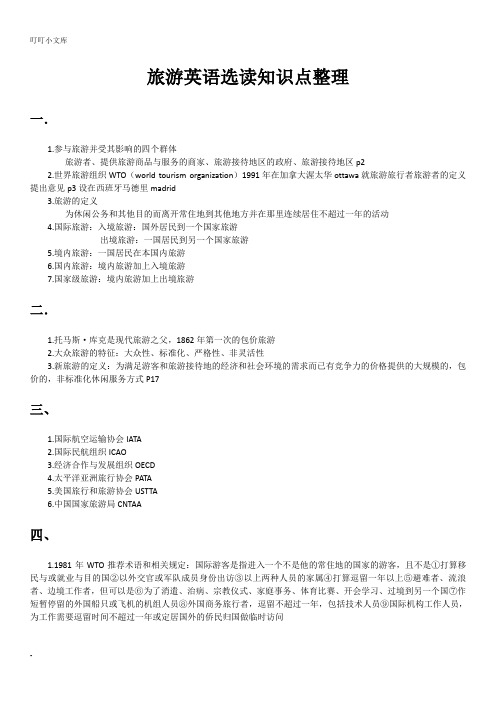
旅游英语选读知识点整理一.1.参与旅游并受其影响的四个群体旅游者、提供旅游商品与服务的商家、旅游接待地区的政府、旅游接待地区p22.世界旅游组织WTO(world tourism organization)1991年在加拿大渥太华ottawa就旅游旅行者旅游者的定义提出意见p3设在西班牙马德里madrid3.旅游的定义为休闲公务和其他目的而离开常住地到其他地方并在那里连续居住不超过一年的活动4.国际旅游:入境旅游:国外居民到一个国家旅游出境旅游:一国居民到另一个国家旅游5.境内旅游:一国居民在本国内旅游6.国内旅游:境内旅游加上入境旅游7.国家级旅游:境内旅游加上出境旅游二.1.托马斯·库克是现代旅游之父,1862年第一次的包价旅游2.大众旅游的特征:大众性、标准化、严格性、非灵活性3.新旅游的定义:为满足游客和旅游接待地的经济和社会环境的需求而已有竞争力的价格提供的大规模的,包价的,非标准化休闲服务方式P17三、1.国际航空运输协会IATA2.国际民航组织ICAO3.经济合作与发展组织OECD4.太平洋亚洲旅行协会PATA5.美国旅行和旅游协会USTTA6.中国国家旅游局CNTAA四、1.1981年WTO推荐术语和相关规定:国际游客是指进入一个不是他的常住地的国家的游客,且不是①打算移民与或就业与目的国②以外交官或军队成员身份出访③以上两种人员的家属④打算逗留一年以上⑤避难者、流浪者、边境工作者,但可以是⑥为了消遣、治病、宗教仪式、家庭事务、体育比赛、开会学习、过境到另一个国⑦作短暂停留的外国船只或飞机的机组人员⑧外国商务旅行者,逗留不超过一年,包括技术人员⑨国际机构工作人员,为工作需要逗留时间不超过一年或定居国外的侨民归国做临时访问五、1.产生旅游的主要因素:可随意支配的净收入增加net discretionary incomes、受教育水平的提高、闲暇时间的增多、交通条件的改善、促销活动p532.旅游的动机:需求和愿望之间的关系、市场营销作用、马斯洛的需求理论(第一需求生理+心理需求安全、归属和爱、尊重、自我实现+智能需求(相对独立的需求) 认知和了解、美)六、旅游的类型:1.休息和消遣2.文化旅游3.教育旅游4.猎奇旅游exotic and unusual holidays 5.旅游作为一种行为标准6.商务旅游七、旅游代理成功的两个因素:良好的经营管理和服务计算机技术的影响computer technology计算机预订系统:computer reservation systems CRS八、宣传册中应该包含的信息:①负责包价旅游的公司名称②采用的交通方式③目的地、旅行路线、时间安排等详细情况④旅行持续时间⑤对旅行景点及所提供食宿类型的全面描述⑥清晰地标明每次旅行的价格,将额外收费清晰地写在同一页上⑦到国外后公司代理是否还提供服务⑧特殊安排的确切情况⑨预定的全部细节,包括取消条件的细节⑩关于可选及必选保险范围的细节①去特色景点旅行所需证件、危及健康的风险和推荐使用的预防注射的细节。
旅游英语知识点总结
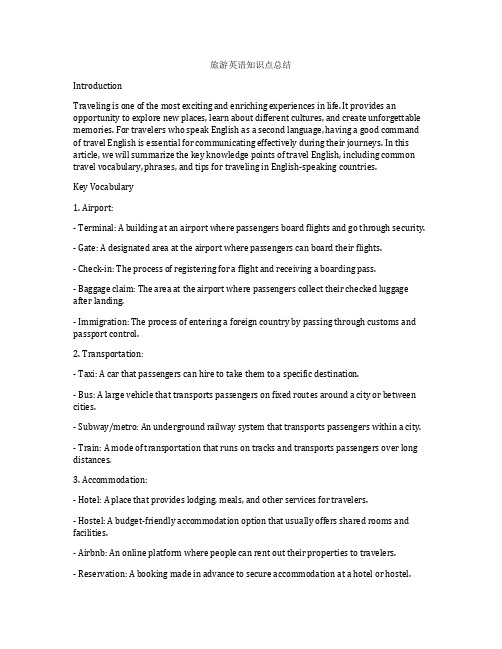
旅游英语知识点总结IntroductionTraveling is one of the most exciting and enriching experiences in life. It provides an opportunity to explore new places, learn about different cultures, and create unforgettable memories. For travelers who speak English as a second language, having a good command of travel English is essential for communicating effectively during their journeys. In this article, we will summarize the key knowledge points of travel English, including common travel vocabulary, phrases, and tips for traveling in English-speaking countries.Key Vocabulary1. Airport:- Terminal: A building at an airport where passengers board flights and go through security. - Gate: A designated area at the airport where passengers can board their flights.- Check-in: The process of registering for a flight and receiving a boarding pass.- Baggage claim: The area at the airport where passengers collect their checked luggage after landing.- Immigration: The process of entering a foreign country by passing through customs and passport control.2. Transportation:- Taxi: A car that passengers can hire to take them to a specific destination.- Bus: A large vehicle that transports passengers on fixed routes around a city or between cities.- Subway/metro: An underground railway system that transports passengers within a city. - Train: A mode of transportation that runs on tracks and transports passengers over long distances.3. Accommodation:- Hotel: A place that provides lodging, meals, and other services for travelers.- Hostel: A budget-friendly accommodation option that usually offers shared rooms and facilities.- Airbnb: An online platform where people can rent out their properties to travelers.- Reservation: A booking made in advance to secure accommodation at a hotel or hostel.4. Dining:- Restaurant: A place where people can order and enjoy prepared meals.- Menu: A list of food and drink items available for ordering at a restaurant.- Waiter/waitress: A person who serves food and drinks to customers at a restaurant.- Tip: An amount of money given to service staff as a thank-you for good service.5. Sightseeing:- Landmark: A famous or historically significant place or monument that attracts visitors. - Tour guide: A person who leads and provides information to tourists during sightseeing trips.- Souvenir: A memento or keepsake purchased as a reminder of a travel experience.- Attractions: Places or activities that are popular among tourists and visitors.Useful Phrases1. Greeting and introduction:- Hello, how are you?- Nice to meet you.- Where are you from?- What brings you to [destination]?2. Asking for directions:- Excuse me, can you tell me how to get to the nearest bus station?- I'm looking for [landmark], could you point me in the right direction?- Is there a taxi stand nearby?3. Making a reservation:- I'd like to book a single/double room for [number of nights].- Do you have any availability for tomorrow night?- What's the rate for a standard room?4. Ordering food and drinks:- Can I see the menu, please?- I'll have the [dish/drink] and a bottle of water, please.- Is there a vegetarian option?5. Emergency situations:- Help! Call the police/ambulance!- I've lost my passport, can you help me?- Is there a hospital nearby?Travel Tips for English-speaking Countries- Familiarize yourself with local customs and cultural norms.- Be mindful of local tipping practices and etiquette.- Learn basic phrases in the local language to show respect and make communication easier. - Keep important travel documents, like passport and visa, in a safe and secure place.- Be open-minded and embrace new experiences and differences.ConclusionMastering travel English is crucial for travelers to effectively communicate and navigate through their journeys in English-speaking countries. By learning and understanding the key vocabulary, phrases, and travel tips, travelers can enhance their travel experience and make the most of their adventures. With good communication skills and cultural awareness, travelers can connect with locals, seek help when needed, and create lasting memories during their travels. So, next time you plan a trip to an English-speaking country, make sure to brush up on your travel English knowledge and get ready for an amazing adventure!。
旅游英语知识点大总结

旅游英语知识点大总结1. Planning a TripBefore you can start traveling, you need to plan your trip. This involves deciding where you want to go, how long you want to stay, and what activities you want to do while you are there. Here are some key travel English knowledge points related to planning a trip:- Asking for travel advice: When planning a trip, it can be helpful to ask for advice from people who have been to the destination you are considering. You can ask questions like, "What are the must-see attractions in Paris?" or "Where is the best place to stay in London?"- Making a travel itinerary: After gathering information about your destination, you can start making a travel itinerary. This involves planning out your activities for each day, including sightseeing, dining, and leisure time.- Setting a travel budget: It is important to set a budget for your trip, including expenses for accommodation, transportation, food, and activities. You can ask questions like, "How much does it cost to stay in a hotel in Rome?" or "How expensive is the public transportation in Tokyo?"- Finding travel information: In order to plan a trip, you will need to gather information about your destination, such as visa requirements, currency exchange rates, and local customs. You can ask questions like, "Do I need a visa to travel to Thailand?" or "What is the currency exchange rate in Mexico?"2. Booking Accommodation and TransportationOnce you have planned your trip, the next step is to book accommodation and transportation. Here are some key travel English knowledge points related to booking accommodation and transportation:- Making hotel reservations: When booking a hotel, you will need to provide information such as your check-in and check-out dates, the number of guests, and any special requests. You can ask questions like, "Do you have any available rooms for the 15th of June?" or "Can I request a non-smoking room?"- Finding transportation options: When traveling to a new destination, it is important to research transportation options, such as public transportation, rental cars, and taxis. You can ask questions like, "How do I get from the airport to downtown?" or "Are there any shuttle services to the beach?"- Booking flights: When booking a flight, you will need to provide information such as your departure and arrival cities, travel dates, and the number of passengers. You can ask questions like, "Do you have any available flights to Paris on the 10th of July?" or "Is there a direct flight from New York to London?"- Renting a car: If you plan on renting a car during your trip, you will need to provide information such as your pick-up and drop-off dates, the type of car you want, and any additional features you require. You can ask questions like, "Do you have any available cars for rent on the 20th of September?" or "Can I add a GPS to my rental car?"3. Navigating Airports and Train StationsOnce you have booked your accommodation and transportation, the next step is to navigate airports and train stations. Here are some key travel English knowledge points related to navigating airports and train stations:- Checking in for a flight: When checking in for a flight, you will need to provide your passport, ticket, and any checked baggage. You can ask questions like, "Where is the check-in counter for flight BA123?" or "What time does the check-in desk open?"- Going through security: When going through airport security, you will need to present your boarding pass and undergo a security screening. You can ask questions like, "Do I need to take off my shoes before going through security?" or "What are the restrictions on bringing liquids through security?"- Boarding a plane: When boarding a plane, you will need to present your boarding pass and follow the instructions of the airline staff. You can ask questions like, "What gate is flight LH456 departing from?" or "Can I bring my carry-on bag on the plane?"- Finding train platforms: When navigating a train station, you will need to find the correct platform for your train. You can ask questions like, "Where is the platform for the train to Edinburgh?" or "What time does the train to Manchester depart?"4. Dealing with Common Travel IssuesEven the most well-planned trips can encounter unexpected issues. Here are some key travel English knowledge points related to dealing with common travel issues:- Language barriers: When traveling to a destination where you do not speak the local language, you may encounter language barriers. In this case, it can be helpful to learn some basic phrases in the local language, such as "hello," "thank you," and "excuse me."- Lost luggage: If your luggage is lost or delayed, you will need to report the issue to the airline and fill out a lost luggage report. You can ask questions like, "What should I do if my luggage is lost?" or "How long will it take for my luggage to be delivered?"- Emergency situations: In the event of an emergency, such as a natural disaster or a medical issue, it is important to follow the instructions of local authorities and seek assistance from embassy or consulate officials.ConclusionTraveling can be an exciting and rewarding experience, but it also requires careful planning and preparation. By understanding the key travel English knowledge points, you can navigate the challenges of traveling with confidence and ease. Whether you are planning a trip, booking accommodation and transportation, navigating airports and train stations, or dealing with common travel issues, having a good understanding of travel-related English will help you have a smooth and enjoyable travel experience. So next time you plan a trip, remember to brush up on your travel English knowledge points so you can make the most of your travel adventure.。
旅游英语专有名词

旅游英语专有名词在旅游行业中,有许多专有名词用于描述不同的景点、设施和服务。
这些英语专有名词在游客和旅行者之间交流时非常常见,了解这些名词可以帮助您更好地理解旅游信息和顺利进行旅行。
以下是一些常见的旅游英语专有名词的介绍:景点1. AttractionsAttractions 是指吸引游客前来参观的景点。
这些景点可以是自然风光、历史古迹、文化遗产等。
例如:Great Wall(长城)、Eiffel Tower(埃菲尔铁塔)等。
2. LandmarksLandmarks 是指标志性的建筑或地标,通常代表着某个城市或地区。
游客常常会前往这些地标进行参观和拍照。
例如:The Statue of Liberty(自由女神像)、Big Ben(大本钟)。
3. MonumentsMonuments 是指纪念性建筑或雕像,通常是为了纪念历史事件或英雄人物。
这些地点也是游客参观的热门景点。
例如:Lincoln Memorial(林肯纪念堂)、Taj Mahal(泰姬陵)。
交通1. AirportAirport 是指机场,是人们乘坐飞机前往不同城市或国家的交通枢纽。
机场提供航班信息、安全检查等服务。
例如:Heathrow Airport(希思罗机场)、JFK Airport(肯尼迪国际机场)。
2. Train StationTrain Station 是指火车站,是乘坐火车出行的重要站点。
在火车站可以购买车票、查询车次信息等。
例如:Grand Central Station(中央车站)、King’s Cross Station(国王十字车站)。
3. Bus TerminalBus Terminal 是指汽车客运站,是乘坐长途巴士的出发和到达站点。
在客运站可以购买车票、等候登车等。
例如:Port Authority Bus Terminal(港务局客运站)、Greyhound Bus Terminal(灰狗巴士站)。
大学旅游英语知识点总结

大学旅游英语知识点总结1. VocabularyOne of the most important aspects of traveling is being able to communicate effectively with others. This includes having a broad vocabulary to describe the different aspects of travel, such as transportation, accommodation, and activities. Students should be familiar with words and phrases related to booking flights, reserving hotels, and navigating within a new city or country. Additionally, they should also be comfortable discussing cultural activities and landmarks, as well as local food and customs.2. Conversation skillsIn addition to vocabulary, it's essential for college students to have strong conversation skills to interact with people from different cultural backgrounds. This includes being able to ask for directions, order food, and engage in casual conversations with locals. Having the ability to communicate in a polite and friendly manner is crucial for building positive relationships while traveling, as well as for gaining a deeper understanding of different cultures.3. Grammar and sentence structureHaving a solid grasp of English grammar and sentence structure is crucial for effective communication while traveling. Students should be able to construct clear and accurate sentences to convey their thoughts and needs. This includes knowing how to form questions, use correct verb tenses, and express themselves with precision. Being able to communicate effectively will not only enhance the travel experience, but also provide students with valuable language skills that can be applied in future academic and professional settings.4. Cultural knowledgeUnderstanding the cultural norms and customs of the places they visit is essential for college students. This includes being aware of local traditions, etiquette, and social practices. Having a basic understanding of the history and geography of a destination can also enrich the travel experience and provide students with a broader perspective of the world. Learning about different cultures can enhance students' empathy and tolerance, and help them appreciate the diversity of the global community.5. Practical knowledgeFinally, it's important for college students to have practical knowledge related to travel, such as knowing how to exchange currency, use public transportation, and navigate through unfamiliar cities. Being prepared and knowledgeable about basic travel logistics can help students feel more confident and capable during their travels, and make the experience more enjoyable and less stressful.In conclusion, college travel provides students with valuable opportunities for personal growth, cultural understanding, and language development. By having a strong command of English language skills and cultural knowledge, students can enhance their travel experiences and gain a deeper appreciation for the world around them.。
八年级上册英语a day out知识点

八年级上册英语a day out知识点A Day Out是八年级上册英语教材第一单元,主要讲述的是节假日游玩的话题,通过本单元的学习,学生们可以掌握如何用英语描述旅游景点,介绍旅游线路,讲述旅游过程中的经历和感受,以及学习如何预订旅游服务。
本文将从以下几个方面总结本单元的重点知识点。
一、词汇1.景点:sightseeing spot;tourist attraction;place of interest。
2.旅行社:travel agency。
3.预订旅游服务:book a tour;make a reservation;reserve a hotel。
4.交通工具:means of transportation。
5.旅游路线:tour itinerary;travel plan。
6.导游:tour guide。
7.纪念品:souvenir。
二、语法1.过去式的用法。
2.“be going to +动词原形”的用法。
3.疑问词的用法。
如:What did you do? When did you go there? How was your trip?三、重点句型1.询问旅游计划:What are you going to do on your holiday? Are you going to travel anywhere?2.描述旅游景点:It's a beautiful place to visit. There are many famous landmarks there.3.介绍旅游路线:We're going to visit a few museums and art galleries. Then we'll have lunch in a nice restaurant and visit a park in the afternoon.4.讲述旅游经历和感受:We had a great time exploring the city. The weather was perfect and we met a lot of friendly locals.5.预订旅游服务:I want to book a tour to the Great Wall. Can you help me make a reservation at a hotel?四、提示1.学生应该熟悉旅游相关的词汇,如景点、旅行社、导游等。
英语八年级下册第四单元3a知识点

英语八年级下册第四单元3a知识点英语八年级下册第四单元3a是课本中关于旅游的一节课,主要是介绍如何询问旅游相关信息,以及如何给出自己的旅游建议和打算。
本文将详细介绍3a中的知识点,以帮助读者更好地掌握相关内容。
1. 询问旅游相关信息在旅游中,询问旅游相关信息是必不可少的环节。
我们可以使用以下句型来询问:- Where do you want to go on vacation?你想去哪里度假呢?- Have you decided where to go yet?你决定去哪里了吗?- How long are you planning to stay?你打算待多长时间?- When are you planning to leave/arrive?你打算什么时候离开/到达?- How are you getting there?你怎么去那里?通过以上句型的使用,可以更好地了解对方的旅游计划,为给出建议和打算打下基础。
2. 给出旅游建议和打算询问完旅游相关信息后,我们可以根据对方的计划给出建议和打算。
以下是一些常用的句型:- I suggest you go t o…我建议你去…- Why don’t you consider going to…?你为什么不考虑去…?- If I were you, I would go to …如果我是你,我会去…- How about going to …?去…如何?- I think you should go to …我认为你应该去…通过使用以上句型,可以帮助对方更好地做出旅游决定,同时也可以展示自己的旅游经验和建议。
3. 描述旅游景点当给出旅游建议后,我们可以使用以下句型来描述旅游景点:- It’s famous for…它以…著名- The scenery there is…那里的风景…- It’s worth visiting…值得去参观- The best time to visit is…最佳参观时间是…- The highlight there is…那里的亮点是…通过使用这些句型,可以更好地描绘旅游景点的特点,帮助对方更好地了解和计划旅游行程。
2021年旅游的英文的相关英语知识
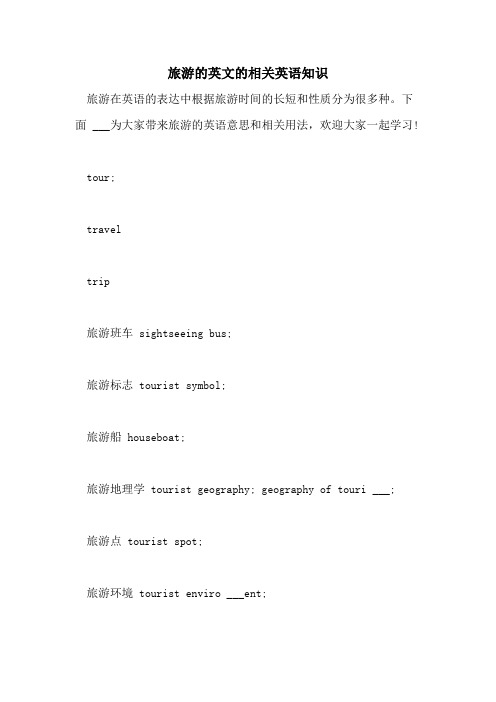
旅游的英文的相关英语知识旅游在英语的表达中根据旅游时间的长短和性质分为很多种。
下面 ___为大家带来旅游的英语意思和相关用法,欢迎大家一起学习! tour;traveltrip旅游班车 sightseeing bus;旅游标志 tourist symbol;旅游船 houseboat;旅游地理学 tourist geography; geography of touri ___;旅游点 tourist spot;旅游环境 tourist enviro ___ent;旅游纪念品 tourist souvenir;旅游界 the tourist circle;旅游林 tourist forest;旅游迷 great travel buff;旅游牧场 dude ranch;旅游年 tourist year;旅游区 tourist area;旅游热 travel [tourist] boom;旅游山庄 tourists' mountain villa; 旅游衫 outing shirt;旅游胜地 tourist attraction;旅游市场 tourist ___rket;旅游事业 tourist industries; tourist trade;旅游图 tourist ___p;旅游团 tourist group; tourist team;旅游旺季 peak tourist season; tourist rush season; 旅游文学 tourist literature;旅游污染 tourist pollution;旅游销售点 shops at tourist attractions;旅游鞋 sneakers; tourist shoes;旅游心理学 tourist psychology;旅游学校 touri ___ school; travel school;旅游业 touri ___; tourist industry;旅游运动 touri ___ sports;旅游者 tourist;旅游证 tourist card;旅游指南 guidebookdevelop and supervise touri ___;发展与管理旅游事业a round-the-world tour;环球旅游Some countries obtain large sums of foreign exchange from touri ___.有些国家靠旅游业赚取大量外汇。
- 1、下载文档前请自行甄别文档内容的完整性,平台不提供额外的编辑、内容补充、找答案等附加服务。
- 2、"仅部分预览"的文档,不可在线预览部分如存在完整性等问题,可反馈申请退款(可完整预览的文档不适用该条件!)。
- 3、如文档侵犯您的权益,请联系客服反馈,我们会尽快为您处理(人工客服工作时间:9:00-18:30)。
What is a Tour Guide?A tour guide is a person who leads tourists to scenic spots and historic attractions and introduces the history and culture of these places to them.Jobs done by Tour Guidesnavigating, communicating, interpreting, role-modeling appropriate behavior, entertaining, treating injury, ensuring safety, managing disasters etcFive Key RolesAn Information Providerbeaquainted with a great deal information about your country, eg. population, nationalities, geography, agriculture and industry, culture and customs, clothing and food, etc.A Teacherhelp inbound tourists learn and understand the history, culture, traditions and important ideas of your city as well as China. An Entertainermake yourself a humorous entertainer, not a stage actor but a friendly, active, high-spirited person to help your guests enjoy their travel.A Hosttake care of your guests; make them feel welcome and comfortable; feed them and accomodate them; protect them and keep them safe.A Disaster Managerknow and practice the routines and procedures needed to adapt in a number of challenging and threatening circumstances; remain cool-headed enough to take right steps when threatened, a new role in a time of globalization and sustainable development.Section C Techniques of Handling Bus Tour Guiding1. Cooperating with the driverLearn to respect your driver partner, distinguish your respective roles and try to establish a professional, friendly, positive and fun relationship with him.2. Dealing with visitors in steps1) deliver a welcome speech;2) set up the ground rules for the tour;3) learn to take a count of visitors in a subtleway;4) try to remember visitors’ name.3. Proper time management1) Timing is crucial to bus tours, and design your commentary beforehand.2) Familiarize yourself with the tour routes and match your commentary with the things within visitors’ sight.3) Note your introduction and explanation must be brief and concise because the bus runs at a fairly high speed.2. Check-in at a hotelsteps for the local guide to follow when checking in the group:1) The local guide should instruct his group to wait in the lobby.2) Help tour leader to go through the check-in procedure.3)Confirm the room arrangements with the tour leader beforehand.4)The receptionist give the tour leader a rooming list and a packet of keys.5) The tour leader assigns the rooms to the group. The local guide introduces the main facilities of the hotel.6) Convey important information to the group.7) Stay in the lobby for 20 minutes after each member gets the key.8) The guide informs the floor attendant when tourists find their rooms dirty and in disorder, or they are having some other problems.Tourist scheduleA very detailed tourist schedule should be worked out after you have read the reception plan carefully. Firstly a receptionplan usually consists of information that can be put into three categories:Travel routeThis part shows the complete travel route of the visitors' stay in China, the entry and exit port cities, time of entry into and exit from China, transportation means at each destination, duration at each destination, and major touristprograms along the travel route.Personal data of the visitorThis part is important for you to plan personalized service for different visitors.Basic information of the tour groupname of the tour organizer, name and code ofthe tour group, number of the visitors, name ofthe tour leader, nationality and working language of the group, special interest and taboos, and so on.principles:1) The schedule should not be too crowded.2) Don't copy an old schedule all the time.3) Don't forget to set free time for the visitor.buy traditionalChinese medicine:• A guide should recommend reliable drugstores to the tourists.• A guide should inform tourists of the limit of traditional Chinese medicine one can take out of China for personal use: product value of RMB300 for foreign tourists; RMB 1500 for tourists from Hong Kong, Macau and T aiwan.• A guide should tell tourists that item such as musk, rhinoceros horn and tiger bone are prohibited from being taken out of China.Quality of the Tour CommentaryGood TimingGroup AwarenessUsing Humor1. What is a Tour Commentary?Generally, a commentary is a piece of written information of a person's explanation and opinion about a person, an object or an event. A tour commentary takes the form of verbal messages, and is considered the information you pass on to your audience when you conduct a tour. In this unit, we will limit a tour commentary to a narrow sense: the information you offer in a spoken form that can help the visitors better understand the theme of the tour.2. What Can Be Expressed in a Tour Commentary?1) Offer Facts2) Add Your Opinions3.Who Are the Audience of Your Commentary?1) Who Are Your Visitors?Find out some basic characteristics of your visitors such as age bracket, educational and cultural background, their gender difference, their nationalities, and their primary interest before you prepare your tour commentary.2) How Many Visitors Are There in a Group?This is a question that might be overlooked. A tour group may contain a different number of visitors, and the presentation for a small group can be very different from that of a large group3) What Do the Visitors Want to Know?It is far from enough just to know who the visitors are. Once you meet your visitors, you should make sure you understand what they expect to know about your place. It may be that they come because they just know the place is interesting. They know part of the history of your place, but they do not know much of it, so they expect to be told more about it. Making Your Commentary Communicable1. Use Appropriate Language2. Make your nonverbal expressions supportive3. Learn to listen to your audienceMake your communication interesting and effective1. Stress features of the site2. Break the tour commentary into several related parts3. Relate the sight with memories4. Use tales and legends5. Make an analogy。
